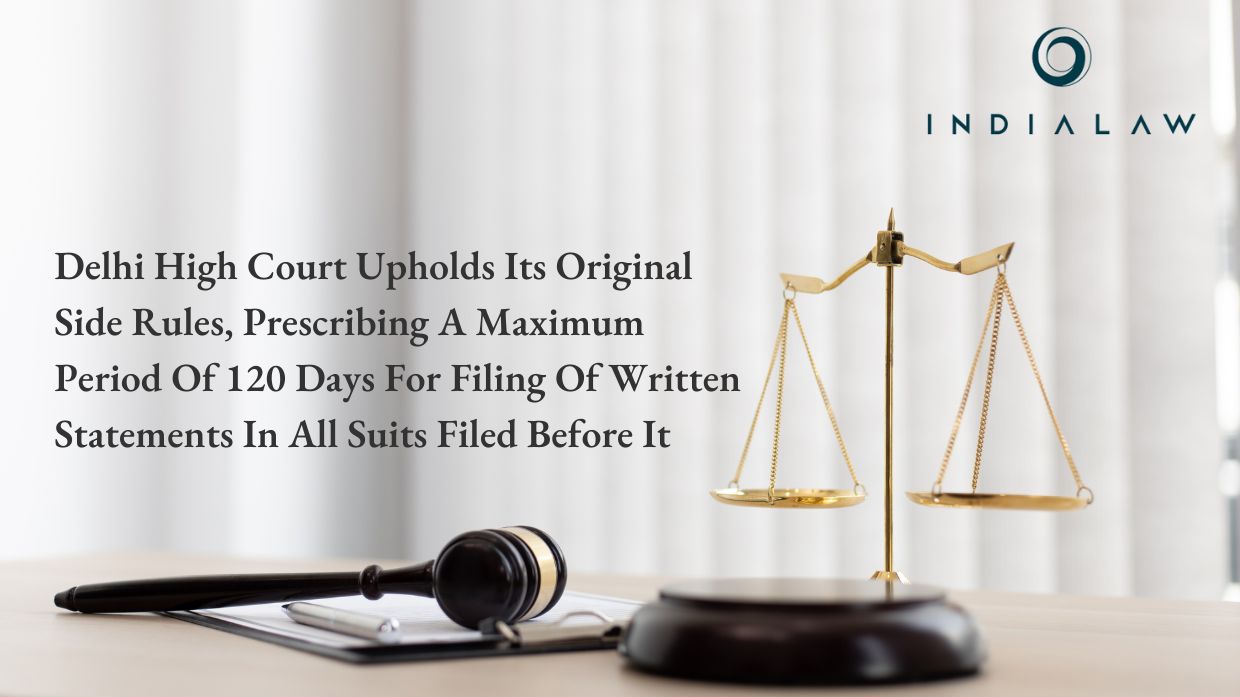Delhi High Court Upholds Its Original Side Rules, Prescribing A Maximum Period Of 120 Days For Filing Of Written Statements In All Suits Filed Before It

The Hon’ble Delhi High Court (“Delhi HC”) was recently presented with a challenge[i] to the constitutionality of Rule 4, Chapter VII of the Delhi High Court (Original Side) Rules, 2018 (“Original Side Rules”)[ii], which mandates a strict timeline of 120 days for filing of written statements even in non-commercial matters.
In essence, the challenge under the petitions was that the mandatory timeline of 120 days for filing of written statements for suits filed originally before the Delhi HC discriminates between those litigants that are parties in non-commercial suits before other civil courts in the territory of Delhi, which follow the provisions of Order VIII Rule 1 of the Code of Civil Procedure, 1908. Pertinently, Order VIII Rule 1 of the Code of Civil Procedure, 1908 (“the Code”), grants discretion to a civil court to condone the delay in filing a written statement in non-commercial matters even beyond 120 days.[iii]
Thus, the petitioners claimed that the Delhi HC had acted ultra vires its powers in prescribing a procedure that is contrary to the Code. The purported discrimination, the petitioners claimed, would result in the Rule 4, Chapter VII of the Original Side Rules as being unconstitutional.
The Delhi HC has, while deciding the instant petitions, purposefully and categorically provided the answer to the challenge raised, in two points. The provisions of the Code, as provided under section 129[iv] therein, provide that in case of a conflict between the rules of a High Court on its original side and the provisions of the Code itself, the former shall reign supreme. In fact, the provisions of section 129 of the Code themselves empower High Courts to make rules as to their original civil procedure. The Delhi HC relied upon the non-obstante clause found in section 129 of the Code, as well as certain earlier decisions[v] to state that the provisions of the Original Side Rules shall prevail in a case of conflict.
The Delhi HC further relied upon section 7 of the Delhi High Court Act, 1966 (“the DHC Act”)[vi], which permits it to frame rules for the practice and procedure for the exercise of its ordinary original civil jurisdiction. Thus, the Delhi HC noted that section 7 of the DHC Act confers authority on the Delhi HC to make rules with respect to practice and procedure for the exercise of its original civil jurisdiction.
In conclusion, the Delhi HC declared that the mandatory period of 120 days prescribed by Rule 4, Chapter VII of the Original Side Rules, will prevail over Order VIII Rule 1 of the Code, in light of section 129 of the Code and section 7 of the DHC Act. In the opinion of the authors, the present decision provides clarity to two aspects of procedural law. Firstly, it provides clarity that the rules prescribed by a High Court in its original side shall prevail over the provisions of the Code. Thus, this decision shall be of assistance in matters before other High Courts as well, if a question as to a conflict between the Code and the High Court’s rules arises. Secondly, it also provides clarity in terms of the procedural rules of the Delhi HC, whereby the mandatory period of 120 days must be followed in filing of written statements, even in non-commercial suits.
[i] W. P. (C) 15091 of 2023 – Manhar Sabharwal v. High Court of Delhi and Ors. with W. P. (C) 15124 of 2023 – Chirag Sharma v. High Court of Delhi and Ors, decision dated 23rd August, 2024. The coram consisted of Manmohan, ACJ, and Mini Pushkarna, J.
[ii] Rule 4, Chapter VII of the Delhi High Court (Original Side) Rules, 2018, reads thus:
“…
4. Extension of time for filing written statement.—If the Court is satisfied that the defendant was prevented by sufficient cause for exceptional and unavoidable reasons in filing the written statement within 30 days, it may extend the time for filing the same by a further period not exceeding 90 days, but not thereafter. For such extension of time, the party in delay shall be burdened with costs as deemed appropriate. The written statement shall not be taken on record unless such costs have been paid/ deposited. In case the defendant fails to file the affidavit of admission/ denial of documents filed by the plaintiff, the documents filed by the plaintiff shall be deemed to be admitted. In case, no written statement is filed within the extended time also, the Registrar may pass orders for closing the right to file the written statement.
…”
[iii] Order VIII, Rule 1 of the Code of Civil Procedure, 1908, reads thus:
“…
ORDER VIII
[Written Statement, Set-off and Counter-claim]
1. Written statement.—The defendant shall, within thirty days from the date of service of summons on him, present a written statement of his defence:
Provided that where the defendant fails to file the written statement within the said period of thirty days, he shall be allowed to file the same on such other day, as may be specified by the Court, for reasons to be recorded in writing, but which shall not be later than ninety days from the date of service of summons.
…”
[iv] Section 129 of the Code of Civil Procedure, 1908, reads thus:
“129. Power of High Courts to make rules as to their original civil procedure – Notwithstanding anything in this Code, any High Court [not being the Court of a Judicial Commissioner] may make such rules not inconsistent with the Letters Patent [or order] [or other law] establishing it to regulate its own procedure in the exercise of its original civil jurisdiction as it shall think fit, and nothing herein contained shall affect the validity of any such rules in force at the commencement of this Code.”
[v] The decisions referred to and relied upon by the Hon’ble Delhi High Court were Iridium India Telecom Ltd. v. Motorola Inc. – (2005) 2 SCC 145; Union of India and Anr. v. G.M. Kokil and Ors. – 1984 Supp SCC 196; M/s. Print Pak Machinery Ltd. v. M/s. Jay Kay Paper Converters – 1979 SCC OnLine Del 123; Ram Sarup Lugani and Anr. v. Nirmal Lugani and Ors. – 2020 SCC OnLine Del 1353; and, Akash Gupta v. Frankfinn Institute of Airhostess Training – 2006 SCC OnLine Del 66.
[vi] Section 7 of the Delhi High Court Act, 1966, reads thus:
“7. Practice and procedure in the High Court of Delhi.—Subject to the provisions of this Act, the law in force immediately before the appointed day with respect to practice and procedure in the High Court of Punjab shall, with the necessary modifications, apply in relation to the High Court of Delhi and accordingly the High Court of Delhi shall have all such powers to make rules and orders with respect to practice and procedure as are immediately before the appointed day exercisable by the High Court of Punjab and shall also have powers to make rules and orders with respect to practice and procedure for the exercise of its ordinary original civil jurisdiction:
Provided that any rules or orders which are in force immediately before the appointed day with respect to practice and procedure in the High Court of Punjab shall, until varied or revoked by rules or orders made by the High Court of Delhi, apply with the necessary modifications in relation to practice and procedure in the High Court of Delhi as if made by that High Court.”
By entering the email address you agree to our Privacy Policy.



